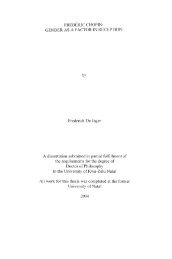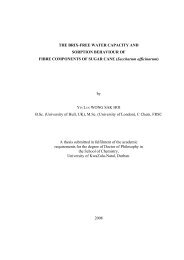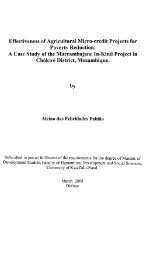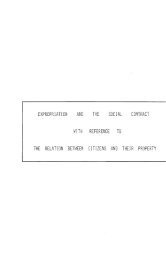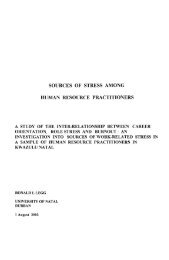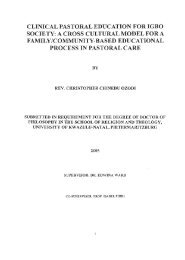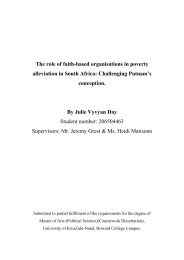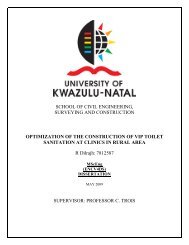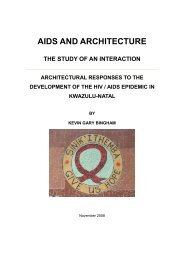- Page 1 and 2:
AN EXPLORATION INTO THE PEDAGOGY OF
- Page 3 and 4:
DECLARATION I, ZINHLE PRIMROSE NKOS
- Page 5 and 6:
I dedicate this thesis to the follo
- Page 7 and 8:
ACKNOWLEDGEMENTS Numerous people ha
- Page 9 and 10:
AMAZWI OKUBONGA Ngifisa ukubonga ku
- Page 11 and 12:
ABSTRACT The problem of poor readin
- Page 13 and 14:
ukuba zithuthuke ekufundeni okubhal
- Page 15 and 16:
UHLU LWEZELEKO (LIST OF APPENDICES)
- Page 17 and 18:
IZINCAZELO ZAMANYE AMAGAMA ABALULEK
- Page 19 and 20:
16. Inhlololwazi (interviews) izing
- Page 21 and 22:
ISAHLUKO 1 ISENDLALELO SOCWANINGO O
- Page 23 and 24:
2.5.2.1 UKUZILUNGISA (SELF CORRECTI
- Page 25 and 26:
ISAHLUKO 5 OKUSHIWO OTHISHA NGOKUFU
- Page 27 and 28:
ISAHLUKO 7 ABAKWENZAYO OTHISHA LAPH
- Page 29 and 30:
9.4.1 IZIPHAKAMISO EZIMAYELANA NOCW
- Page 31 and 32:
Harly, 2006). USolwazi uSolomon Sib
- Page 33 and 34:
Ngesikhathi kusungulwa i-Readathon
- Page 35 and 36:
10 kuya phezulu. Ngikusho lokhu ngo
- Page 37 and 38:
Uhulumeni waseNingizimu Afrika usus
- Page 39 and 40:
laseNingizimu Afrika kuphela, kodwa
- Page 41 and 42: okufunda, ukubhala kanye nokubala a
- Page 43 and 44: Kokubili-ke isiZulu njengolimi lwas
- Page 45 and 46: lwasekhaya bayahlomula ngalezi zinh
- Page 47 and 48: imiphumela yocwaningo lwangonyaka w
- Page 49 and 50: Kodwa manje ukufunda ukufunda okubh
- Page 51 and 52: 1.16UKUFUNDA OKUBHALIWE NGOKWANAMUH
- Page 53 and 54: angamaphesenti angama-21 (Zulu Lang
- Page 55 and 56: phakathi neKwaZulu-Natal, esikhulun
- Page 57 and 58: inhlolokhono isenziwa ngaso isiNgis
- Page 59 and 60: yokuthi zase zinezingane okudinga z
- Page 61 and 62: zonke izinsuku. Uma abafundi sebefu
- Page 63 and 64: enza iphutha lo mfundi kwakuyinduku
- Page 65 and 66: 1.14 INHLOSO YOCWANINGO NALAPHO LUG
- Page 67 and 68: � Isahluko sesihlanu sethula umbi
- Page 69 and 70: 2.1 ISINGENISO Esahlukweni esedlule
- Page 71 and 72: Njengoba sengike ngachaza, ucwaning
- Page 73 and 74: kokubuka othisha ngenkathi befundis
- Page 75 and 76: ) nokufunda okubhaliwe ngesiNgisi u
- Page 77 and 78: ngokuqondisisa (comprehension), uku
- Page 79 and 80: Ngaphandle kolwazi abafundi abavele
- Page 81 and 82: ngayo lapho befunda ulimi lwabo iba
- Page 83 and 84: ULevine nabanye (2000) bathi: “Th
- Page 85 and 86: uzoveza ulwazi olusha kulo mkhakha
- Page 87 and 88: 2.3.1 UKUFUNDA OKUBHALIWE NGOKWE-SO
- Page 89 and 90: ezincane. Isibonelo, izinhlamvu (le
- Page 91: kuphela, kodwa nomuntu omdala uyafu
- Page 95 and 96: ngolimi, amakhono okuhlaziya amagam
- Page 97 and 98: usedlulile ebangeni lesithathu esik
- Page 99 and 100: kodwa nasezincazelweni nasekwakhiwe
- Page 101 and 102: Ububi bale ndlela yilobu obulandela
- Page 103 and 104: 2.4.4 INDLELA EYINGXUBE (ECLECTIC A
- Page 105 and 106: 2.4.6. I-WHOLE LANGUAGE APPROACH I-
- Page 107 and 108: 2.6 AMASU OKUFUNDISA UKUFUNDA OKUBH
- Page 109 and 110: ekufundiseni ukufunda emabangeni om
- Page 111 and 112: 2.5.3 AMASU ASETSHENZISWA NGEMVA KO
- Page 113 and 114: ucwaningo luveza ukuthi abakwenzayo
- Page 115 and 116: 3.2 UMKLAMO NEZINDLELA ZOKUQHUBA UC
- Page 117 and 118: semfundo njengoba onke amanye amakh
- Page 119 and 120: umcwaningi aqonde kahle ukuthi othi
- Page 121 and 122: kahle konke abakushoyo. UFilstead (
- Page 123 and 124: akusiwona amagama angempela ngenxa
- Page 125 and 126: lungathathwa njengeziqalo zocwaning
- Page 127 and 128: ongumhlanganyeli wocwaningo bavumel
- Page 129 and 130: ngalokhu ocwaningwayo akushilo, aza
- Page 131 and 132: lwasekhaya. Lokhu kwakuzosiza ekuth
- Page 133 and 134: kuyindawo esengake ngahlala kuyo. N
- Page 135 and 136: engingakaze ngizwe ngayo phambilini
- Page 137 and 138: yokulandelisa, eyayilandela umbuzo
- Page 139 and 140: kwalawo ma-themes athe ukujula impe
- Page 141 and 142: ingakwazi ukwenabela kubantu, noma
- Page 143 and 144:
4.1 ISINGENISO ISAHLUKO 4 UHLAKA LW
- Page 145 and 146:
feminists, yama-constructivists, ya
- Page 147 and 148:
ewufundayo, indawo lapho esuke ifun
- Page 149 and 150:
ulwazi olusha nolwazi abavele benal
- Page 151 and 152:
ndawo lapho lukhulunywa khona kanti
- Page 153 and 154:
ukuze kucace indawo ami kuyo ezinca
- Page 155 and 156:
ukuze kuthi lapho esekhulile, kuthi
- Page 157 and 158:
Oluningi ucwaningo lwaluvama ukubhe
- Page 159 and 160:
Baningi abazali abangakhulumi nezin
- Page 161 and 162:
umphakathi nakho konke okuyizungezi
- Page 163 and 164:
oqinisekisa ukuthi ukufunda okubhal
- Page 165 and 166:
ngoba konke lokhu kuzomsiza ekuthen
- Page 167 and 168:
ibeka ukuthi ulwazi lwemisindo lush
- Page 169 and 170:
I- Teachers Handbook for Teaching R
- Page 171 and 172:
4.7.4.1.3 ULWAZIMAGAMA (VOCABULARY)
- Page 173 and 174:
ngokuqondisisa kuncike olwazini umf
- Page 175 and 176:
Kanjalo ne-The Reading Comprehensio
- Page 177 and 178:
ilandela imiyalelo edingwa yimibuzo
- Page 179 and 180:
ISAHLUKO 5 OKUSHIWO OTHISHA NGOKUFU
- Page 181 and 182:
ngaphandle kukankamisa ‘i’. Unk
- Page 183 and 184:
njengoba echaza ukuthi abanye abant
- Page 185 and 186:
Kwaqapheleka ukuthi othisha abaning
- Page 187 and 188:
ongakhulumi, ngoba basuke bengekho
- Page 189 and 190:
Sekuzoxoxwa-ke ngaleli dada, nobeng
- Page 191 and 192:
uNtombifuthi waphendula kanje ngenk
- Page 193 and 194:
ungakhulumi ngemisho enemisindo aba
- Page 195 and 196:
eseyifundile, uye abasize abalekele
- Page 197 and 198:
Kanti uthisha uZandile ubeka kanje:
- Page 199 and 200:
ingaveza isithombe sakwandabazabant
- Page 201 and 202:
Lapho bebuzwa ukuthi ziyiphi ezinye
- Page 203 and 204:
Njengoba ucwaningo oluningi luveza
- Page 205 and 206:
Kwesinye isikhathi ngiye ngenze sam
- Page 207 and 208:
efunda ngabodwana. Imvamisa bafunda
- Page 209 and 210:
Baye baphendule imibuzo...mhlampe k
- Page 211 and 212:
anolwazi oluthile ababelana ngalo a
- Page 213 and 214:
5.2.6. UKWENZA IKILASI LIKUFANELE U
- Page 215 and 216:
ayijwayele ukuba nenkinga esikoleni
- Page 217 and 218:
ngokungangingizi kanye nokufunda ng
- Page 219 and 220:
asebenzisa ziphi izindlela namasu,
- Page 221 and 222:
okwenzeka kulezi zikole zombili, ko
- Page 223 and 224:
Ngezansi yisibonelo semisindo eyayi
- Page 225 and 226:
elehlukile, njengokuthi nje enze ok
- Page 227 and 228:
L: Ngephini T: Yebo iphini L: Pheph
- Page 229 and 230:
L: Liyaphephuka T: lenzenjani iphep
- Page 231 and 232:
Fig. 4 Umsebenzi owawubhalwa ekilas
- Page 233 and 234:
Emva kokufunda amagama ephindelelwa
- Page 235 and 236:
Lokhu kwaveza umqondo wokungahleli
- Page 237 and 238:
Lo mfundi owayenza lo msebenzi, kuy
- Page 239 and 240:
lokhu, okuyinto okumele ngabe uyijw
- Page 241 and 242:
Fig. 11 Umsebenzi womfundi 2 wesibi
- Page 243 and 244:
Fig. 13 Umsebenzi womfundi 4 wesibi
- Page 245 and 246:
ngokwakwenzeka esikoleni iGolide en
- Page 247 and 248:
L: Uphethwe yikhanda T: Omunye futh
- Page 249 and 250:
Reading Rockets, 2009; Zimmermann &
- Page 251 and 252:
6.2.2.4 NGOLWESINE NgoLwesine uthis
- Page 253 and 254:
Kule ndaba kuyakhombisa ukuthi uthi
- Page 255 and 256:
ngamunye umusho akhombe ingane ukub
- Page 257 and 258:
okubhaliwe kumfundi. Okwenzeka kule
- Page 259 and 260:
umcwaningi wayefuna ukuqiniseka uku
- Page 261 and 262:
7.2.1.2 OKWAKWENZEKA ESIKOLENI IMBA
- Page 263 and 264:
Nakuba ebangeni lesithathu amagama
- Page 265 and 266:
Lapho sebeqedile ukufunda amagama u
- Page 267 and 268:
L: Ingwici. T: Konje uma uphethwe i
- Page 269 and 270:
Fig. 19 Imisho eyayigcwaliswa ngaba
- Page 271 and 272:
amabili ayewahlukanisile ekilasini.
- Page 273 and 274:
ebhodini, bese ethi abakhe imisho n
- Page 275 and 276:
ubudlelwano nokufundwa kombhalo, ng
- Page 277 and 278:
T: Ake siphinde siwafunde sonke fut
- Page 279 and 280:
7.2.1.3.2 NGOLWESIBILI Ngosuku lwan
- Page 281 and 282:
(Lehr et al, 2008; Duffy, 2009; Mak
- Page 283 and 284:
L: UMaza noZola. T: Konje sitheni n
- Page 285 and 286:
T: Funda. L6: Izindaba ku-TV zaziyi
- Page 287 and 288:
ngezinye izindlela. Yingakho nje ng
- Page 289 and 290:
abazange baye emtatsheni wolwazi. I
- Page 291 and 292:
ndlela ye-look-and-say ingane ifund
- Page 293 and 294:
kufanele bafunde ngokuqonda umbhalo
- Page 295 and 296:
omunye onconyiwe nguthisha. Lokhu k
- Page 297 and 298:
ezinganakwa ngabazali, nakuba zazik
- Page 299 and 300:
T: Nizobhala isipelingi, kumele nit
- Page 301 and 302:
7.3 IQOQA LESAHLUKO Kulesi sahluko
- Page 303 and 304:
8.2 UKUBAMBELELA EZINKOLELWENI NGOK
- Page 305 and 306:
yokufundwayo njengokuthi zizakhele
- Page 307 and 308:
phambili ekwakhiweni kolwazi olusha
- Page 309 and 310:
okubhaliwe. Kanjalo no-Inglis naban
- Page 311 and 312:
for Learning; kanjalo ne-National R
- Page 313 and 314:
Njengoba ngike ngachaza esahlukweni
- Page 315 and 316:
La mazwi akhombisa ukuthi kade yaba
- Page 317 and 318:
Nokho-ke lokhu akusho ukuthi ukufun
- Page 319 and 320:
Ngakho-ke ngenxa yokungabi naso isi
- Page 321 and 322:
8.4 UKUZENYEZA KOTHISHA NGOLIMI LWE
- Page 323 and 324:
ukukhuluma afana namabizo athile, i
- Page 325 and 326:
sezingxoxo ezaba ngemumva kokubukel
- Page 327 and 328:
La mazwi angenhla angethusa ngoba a
- Page 329 and 330:
siyazifaka izinyanga zonyaka zesiZu
- Page 331 and 332:
9.1 ISINGENISO ISAHLUKO 9 ISIPHETHO
- Page 333 and 334:
Nakuba ngokwabo beziveza izizathu z
- Page 335 and 336:
ngokuzokwenzeka embhalweni, ziseben
- Page 337 and 338:
oluzobheka izindlela zokufundisa ok
- Page 339 and 340:
yini ngenxa yezilimi zabo ezingeson
- Page 341 and 342:
IMITHOMBO ESETSHENZISIWE Abadzi, H.
- Page 343 and 344:
Barone, D. (2002). Literacy Teachin
- Page 345 and 346:
Bohannan, J.N. (1993). Theoretical
- Page 347 and 348:
Cohen, L., Manion, L. and Morrison,
- Page 349 and 350:
Dickinson, D.K. and Neuman, S.B. (2
- Page 351 and 352:
Fecteau, M.L. (1999). First and Sec
- Page 353 and 354:
Hamlyn, M. (07 January 2010). Motsh
- Page 355 and 356:
Kukan, L., and Beck, I.L. (1997). T
- Page 357 and 358:
Magubane, K. (2008). Major Plans to
- Page 359 and 360:
National Reading Panel. (2000). Tea
- Page 361 and 362:
Pardo, L.S. (2004). What Every Teac
- Page 363 and 364:
RAND Reading Study Group. (2002). R
- Page 365 and 366:
Segalwe, O. (2006). SA's R6bn Liter
- Page 367 and 368:
Stahl, S.A. and Miller, P.D. (1989)
- Page 369 and 370:
Thorndike, R.L. (1973). Reading Com
- Page 371 and 372:
Wessels, M. and van den Berg, R. (1
- Page 373 and 374:
ISELEKO 1: UHLELO LWEMIBUZO YEZINGX
- Page 375 and 376:
...................................
- Page 377 and 378:
5. Ngesikhathi sezingxoxo wawubeke
- Page 379 and 380:
Seating arrangement Does the seatin
- Page 381 and 382:
The study will benefit the school i
- Page 383 and 384:
• Findings will be disseminated t
- Page 385 and 386:
• The school will have an opportu
- Page 387 and 388:
Uma unemibuzo mayelana nalolu cwani
- Page 389 and 390:
ISELEKO 9: UMSEBENZI KATHISHA UTHAN
- Page 391 and 392:
ISELEKO 11: IKHADI LOKUBONGA LEZING
- Page 393 and 394:
364
- Page 395 and 396:
366
- Page 397 and 398:
368
- Page 399 and 400:
370
- Page 401 and 402:
372
- Page 403 and 404:
374
- Page 405 and 406:
376
- Page 407 and 408:
378
- Page 409 and 410:
380
- Page 411 and 412:
382
- Page 413 and 414:
384
- Page 415 and 416:
386
- Page 417 and 418:
388



